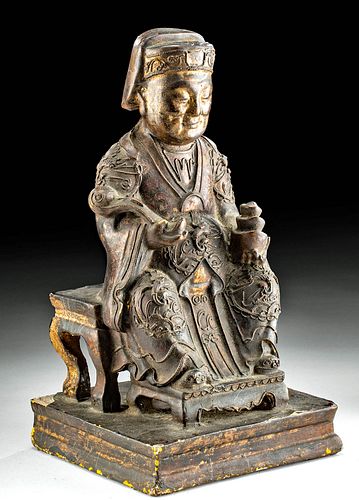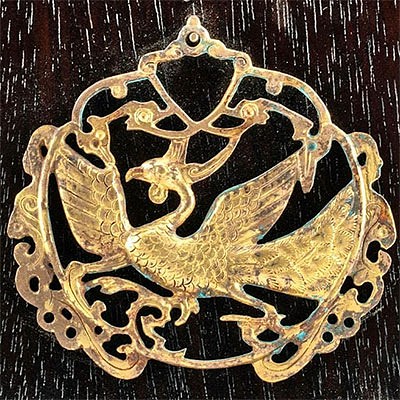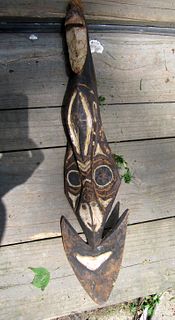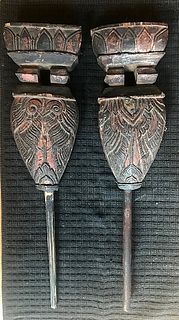19th C. Chinese Qing Wood Empress Statue
Lot 89
About Seller
Artemis Gallery
686 S Taylor Ave, Ste 106
Louisville, CO 80027
United States
Selling antiquities, ancient and ethnographic art online since 1993, Artemis Gallery specializes in Classical Antiquities (Egyptian, Greek, Roman, Near Eastern), Asian, Pre-Columbian, African / Tribal / Oceanographic art. Our extensive inventory includes pottery, stone, metal, wood, glass and textil...Read more
Categories
Estimate:
$200 - $300
Absentee vs Live bid
Two ways to bid:
- Leave a max absentee bid and the platform will bid on your behalf up to your maximum bid during the live auction.
- Bid live during the auction and your bids will be submitted real-time to the auctioneer.
Bid Increments
| Price | Bid Increment |
|---|---|
| $0 | $25 |
| $300 | $50 |
| $1,000 | $100 |
| $2,000 | $250 |
| $5,000 | $500 |
| $10,000 | $1,000 |
| $20,000 | $2,500 |
| $50,000 | $5,000 |
| $100,000 | $10,000 |
| $200,000 | $20,000 |
About Auction
By Artemis Gallery
Jun 17, 2021
Set Reminder
2021-06-17 10:00:00
2021-06-17 10:00:00
America/New_York
Bidsquare
Bidsquare : Ancient & Ethnographic Art Through The Ages
https://www.bidsquare.com/auctions/artemis-gallery/ancient-ethnographic-art-through-the-ages-7094
Ancient art from Egypt, Greece, Italy and the Near East, as well as Asian, Fossils, Pre-Columbian, Native American, African / Tribal / Oceanic, Fine art, and much more! All categories, all price ranges... all legally acquired and guaranteed to be as described or your money back. Artemis Gallery info@artemisgallery.com
Ancient art from Egypt, Greece, Italy and the Near East, as well as Asian, Fossils, Pre-Columbian, Native American, African / Tribal / Oceanic, Fine art, and much more! All categories, all price ranges... all legally acquired and guaranteed to be as described or your money back. Artemis Gallery info@artemisgallery.com
- Lot Description
East Asia, China, Qing Dynasty, ca. late 19th century CE. A fabulous hand-carved wooden figure of an empress of the Xuande Emperor shown seated on a bench atop an integral plinth with her feet elevated on a foot stool. Capped with a flat-topped headdress and veil, the elegant lady is elaborately adorned wearing a feiyufu - a floor-length robe decorated with tondos of a feiyu or flying fish, which were bestowed upon favorites of the emperor. She holds an imperial scepter known as a ruyi in her right hand as a symbol of her power and authority and a model of a pagoda in her left, perhaps a reference to emperor's name, Xuande, which translates to "Proclamation of Virtue." Her square face is skillfully sculpted with downcast eyes, an arched brow, a flat nose, prominent cheekbones, and a gentle smile. The light signs of age, such as her wrinkled brow and sunken cheeks, indicate that this depiction was likely of the empress in her later years. The entirety of the sculpture is enveloped in a rich mocha-hued resin with underpainting in pink, black, gold, and white pigment creating a lovely floral pattern that dances across her robes. A reign mark can be found on the empress's verso, indicating that the empress is part of the Xuande ruling family of the Ming Dynasty. Size: 6.625" L x 6" W x 12" H (16.8 cm x 15.2 cm x 30.5 cm)
Provenance: private Morrison, Colorado, USA collection
All items legal to buy/sell under U.S. Statute covering cultural patrimony Code 2600, CHAPTER 14, and are guaranteed to be as described or your money back.
A Certificate of Authenticity will accompany all winning bids.
We ship worldwide and handle all shipping in-house for your convenience.
#163844Chip to back left corner of plinth. Nicks, abrasions, and scratches throughout. Otherwise, excellent with nice patina and liberal remains of gilding.Condition
- Shipping Info
-
All shipping is handled in-house for your convenience. Your invoice from Artemis Gallery will include shipping calculation instructions. If in doubt, please inquire BEFORE bidding for estimated shipping costs for individual items.
-
- Buyer's Premium



 EUR
EUR CAD
CAD AUD
AUD GBP
GBP MXN
MXN HKD
HKD CNY
CNY MYR
MYR SEK
SEK SGD
SGD CHF
CHF THB
THB













